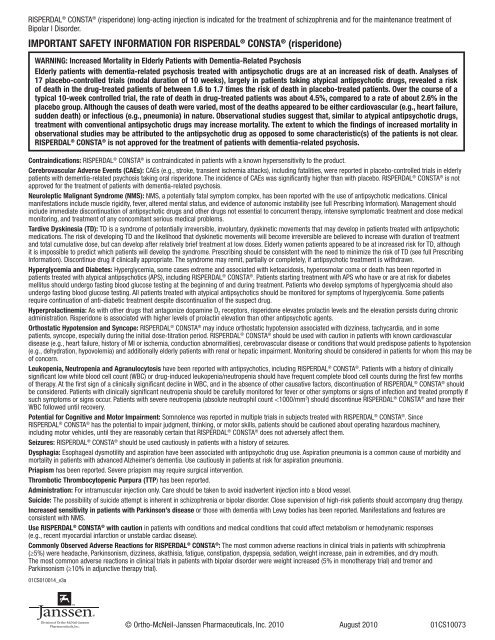AVERAGE SALES PRICE (ASP) FOR MEDICARE ... - Janssen CNS
AVERAGE SALES PRICE (ASP) FOR MEDICARE ... - Janssen CNS
AVERAGE SALES PRICE (ASP) FOR MEDICARE ... - Janssen CNS
Create successful ePaper yourself
Turn your PDF publications into a flip-book with our unique Google optimized e-Paper software.
RISPERDAL ® CONSTA ® (risperidone) long-acting injection is indicated for the treatment of schizophrenia and for the maintenance treatment of<br />
Bipolar I Disorder.<br />
IMPORTANT SAFETY IN<strong>FOR</strong>MATION <strong>FOR</strong> RISPERDAL ® CONSTA ® (risperidone)<br />
WARNING: Increased Mortality in Elderly Patients with Dementia-Related Psychosis<br />
Elderly patients with dementia-related psychosis treated with antipsychotic drugs are at an increased risk of death. Analyses of<br />
17 placebo-controlled trials (modal duration of 10 weeks), largely in patients taking atypical antipsychotic drugs, revealed a risk<br />
of death in the drug-treated patients of between 1.6 to 1.7 times the risk of death in placebo-treated patients. Over the course of a<br />
typical 10-week controlled trial, the rate of death in drug-treated patients was about 4.5%, compared to a rate of about 2.6% in the<br />
placebo group. Although the causes of death were varied, most of the deaths appeared to be either cardiovascular (e.g., heart failure,<br />
sudden death) or infectious (e.g., pneumonia) in nature. Observational studies suggest that, similar to atypical antipsychotic drugs,<br />
treatment with conventional antipsychotic drugs may increase mortality. The extent to which the findings of increased mortality in<br />
observational studies may be attributed to the antipsychotic drug as opposed to some characteristic(s) of the patients is not clear.<br />
RISPERDAL ® CONSTA ® is not approved for the treatment of patients with dementia-related psychosis.<br />
Contraindications: RISPERDAL ® CONSTA ® is contraindicated in patients with a known hypersensitivity to the product.<br />
Cerebrovascular Adverse Events (CAEs): CAEs (e.g., stroke, transient ischemia attacks), including fatalities, were reported in placebo-controlled trials in elderly<br />
patients with dementia-related psychosis taking oral risperidone. The incidence of CAEs was significantly higher than with placebo. RISPERDAL ® CONSTA ® is not<br />
approved for the treatment of patients with dementia-related psychosis.<br />
Neuroleptic Malignant Syndrome (NMS): NMS, a potentially fatal symptom complex, has been reported with the use of antipsychotic medications. Clinical<br />
manifestations include muscle rigidity, fever, altered mental status, and evidence of autonomic instability (see full Prescribing Information). Management should<br />
include immediate discontinuation of antipsychotic drugs and other drugs not essential to concurrent therapy, intensive symptomatic treatment and close medical<br />
monitoring, and treatment of any concomitant serious medical problems.<br />
Tardive Dyskinesia (TD): TD is a syndrome of potentially irreversible, involuntary, dyskinetic movements that may develop in patients treated with antipsychotic<br />
medications. The risk of developing TD and the likelihood that dyskinetic movements will become irreversible are believed to increase with duration of treatment<br />
and total cumulative dose, but can develop after relatively brief treatment at low doses. Elderly women patients appeared to be at increased risk for TD, although<br />
it is impossible to predict which patients will develop the syndrome. Prescribing should be consistent with the need to minimize the risk of TD (see full Prescribing<br />
Information). Discontinue drug if clinically appropriate. The syndrome may remit, partially or completely, if antipsychotic treatment is withdrawn.<br />
Hyperglycemia and Diabetes: Hyperglycemia, some cases extreme and associated with ketoacidosis, hyperosmolar coma or death has been reported in<br />
patients treated with atypical antipsychotics (APS), including RISPERDAL ® CONSTA ® . Patients starting treatment with APS who have or are at risk for diabetes<br />
mellitus should undergo fasting blood glucose testing at the beginning of and during treatment. Patients who develop symptoms of hyperglycemia should also<br />
undergo fasting blood glucose testing. All patients treated with atypical antipsychotics should be monitored for symptoms of hyperglycemia. Some patients<br />
require continuation of anti-diabetic treatment despite discontinuation of the suspect drug.<br />
Hyperprolactinemia: As with other drugs that antagonize dopamine D 2 receptors, risperidone elevates prolactin levels and the elevation persists during chronic<br />
administration. Risperidone is associated with higher levels of prolactin elevation than other antipsychotic agents.<br />
Orthostatic Hypotension and Syncope: RISPERDAL ® CONSTA ® may induce orthostatic hypotension associated with dizziness, tachycardia, and in some<br />
patients, syncope, especially during the initial dose-titration period. RISPERDAL ® CONSTA ® should be used with caution in patients with known cardiovascular<br />
disease (e.g., heart failure, history of MI or ischemia, conduction abnormalities), cerebrovascular disease or conditions that would predispose patients to hypotension<br />
(e.g., dehydration, hypovolemia) and additionally elderly patients with renal or hepatic impairment. Monitoring should be considered in patients for whom this may be<br />
of concern.<br />
Leukopenia, Neutropenia and Agranulocytosis have been reported with antipsychotics, including RISPERDAL ® CONSTA ® . Patients with a history of clinically<br />
significant low white blood cell count (WBC) or drug-induced leukopenia/neutropenia should have frequent complete blood cell counts during the first few months<br />
of therapy. At the first sign of a clinically significant decline in WBC, and in the absence of other causative factors, discontinuation of RISPERDAL ® CONSTA ® should<br />
be considered. Patients with clinically significant neutropenia should be carefully monitored for fever or other symptoms or signs of infection and treated promptly if<br />
such symptoms or signs occur. Patients with severe neutropenia (absolute neutrophil count


